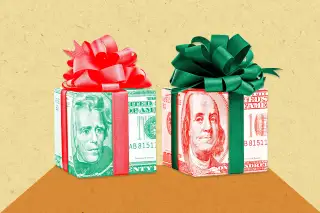Half of Americans Plan to Take on Holiday Debt. Here’s How to Avoid It

As the holiday season fast approaches, many Americans are already bracing for a financial hangover that could last well into the new year.
Gallup's latest holiday forecast shows Americans plan to spend about the same on gifts this year as last year — though the average amount ($1,007) is near record highs. A new survey from the American Institute of CPAs (AICPA), meanwhile, finds that nearly half of the people planning to spend on gifts and travel expect to take on debt to do so. That's despite many saying they intend to rein in spending, in part because higher prices may mean shoppers are spending more even if they're buying fewer items.
Between gift-giving, end-of-year parties and traveling to visit family, the holidays are a perpetual budget-buster. But this year, many Americans are already stretched thin thanks to higher prices on everyday essentials, with about 24% of U.S. households living paycheck to paycheck in 2025 — a small uptick from last year. That means holiday spending could add financial stress on consumers who are already feeling overburdened.
For many shoppers, that spending will land on credit cards. According to the AICPA survey, roughly 79% of people planning to spend on gifts or travel this holiday season expect to use a credit card, and more than half (52%) say they don’t plan to pay off their holiday balances in full when the bill comes due. Among those who anticipate carrying holiday debt, 17% expect it will take more than six months to pay it off, and more than a third say they’ll rely on flexible payment options such as buy now, pay later (BNPL) services to manage the tab.
The financial strain is often compounded by emotional pressures as more people report feeling obligated to buy gifts they can't afford — a behavior Beyond Finance, a debt settlement company, has dubbed “guilt-giving.” Others fall into “FOMO-spending,” where the urge to keep up with friends or trends also leads to making impulse purchases.
“When spending is driven by emotions rather than a plan, it can get out of hand,” Dan Snyder, director of personal financial planning at AICPA, said in the report. “Left unchecked, impulse spending, whether it’s on gifts, travel or entertaining, can lead to serious financial drain. Having a plan can help spenders start the New Year with their financial wellness intact.”
How to budget and avoid unnecessary holiday debt
To create a holiday spending plan, start by setting a budget for gifts, travel and entertaining. Be sure to map out what you can afford to spend before Black Friday and peak shopping days approach, so you're not distracted by flashy sales. Decide who you're buying for and how much you’re willing to spend on each person — and then stick to the list. Even small impulse purchases can quickly add up and lead to the kind of financial strain you're trying to avoid. If you love the dopamine hit you get from an impulse purchase, you can build that into your plan. Set aside $50 or $100 of fun money so you can scratch the itch when you see something you like without blowing your budget.
Many consumers are turning to handmade or DIY gifts as a way to stretch budgets, according to Deloitte’s 2025 Holiday Retail Survey. Crafting your own gifts can save you money with the right planning, but it can also backfire if you buy pricey craft kits, overspend on supplies or underestimate the time involved. If you choose to go the DIY route, set a budget for materials, reuse what you already have, shop thrift or discount stores — and avoid setting yourself up for failure by taking on an ambitious craft project you’ll abandon with glitter in your hair and nothing to wrap.
If you’re planning to travel over the holidays, consider using credit card points or miles to help cut costs on flights, hotels or car rentals. Booking early and being flexible with your travel dates can also help you avoid sky-high prices. In many cases, flying on the holiday itself is cheaper, since the days before and after major holidays like Thanksgiving, Christmas Eve and Christmas Day tend to be some of the busiest (and most expensive) travel days of the year.
Given how many shoppers expect to carry balances into the new year, having a strategy to manage — and ideally prevent — holiday debt is essential. When it comes to credit card debt, the goal is to pay off balances as quickly as possible. Interest charges can pile up fast, turning your balance into a long-term financial burden. If paying in full isn’t feasible, set a realistic payment plan to chip away at the debt. Keep in mind that wracking up debt on your credit card now may require cutting back later. If you don't have extra cash on hand to pay for holiday expenses without financing it, you may not have it in January or February either — unless you're anticipating a bigger-than-normal payday.
Finally, be cautious with BNPL plans. While they can be convenient, they also stretch holiday debt over several months, making it easy to underestimate how multiple staggered payments will impact your budget. Many "pay-in-four" BNPL loans don't charge interest if payments are made on time, but late payments can trigger fees. And some longer-term BNPL options do charge interest — sometimes at rates comparable to (or even higher than) credit cards. The key is to stay on top of payment due dates and avoid stacking too many installments at once.
More from Money:
DIY Holiday Gifts Might Save You Less Money Than You Think
From Inflation to AI Gift Ideas, Here's How Holiday Shopping Will Be Different This Year